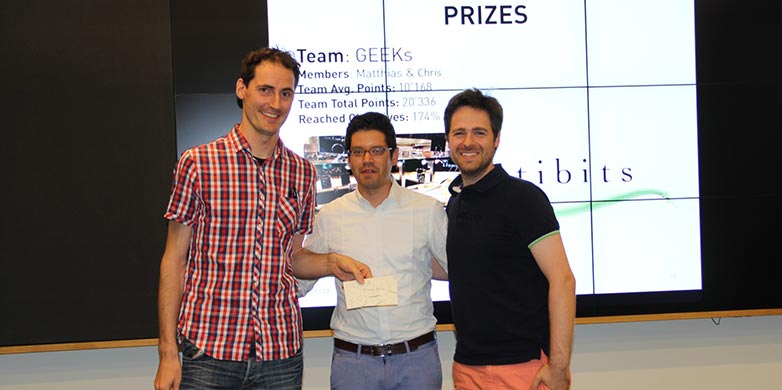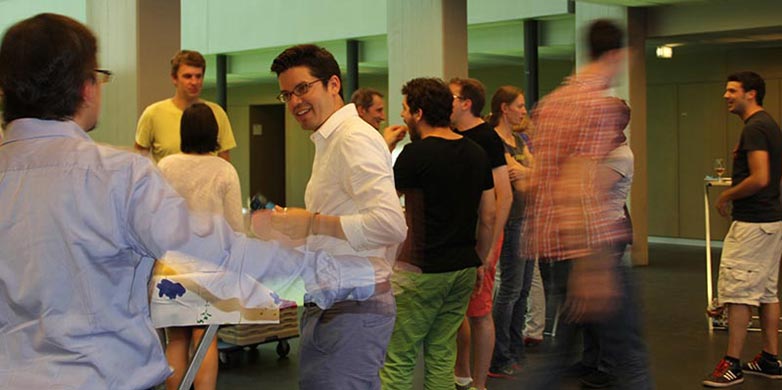35,000 schemes designed to boost sustainability at ETH Zurich
During ETH Zurich’s first Energy Efficiency Challenge, 429 employees and students spent three weeks gearing their everyday activities towards sustainability – and they have so far reduced their CO2 emissions by almost 1,000 kilograms in the process.
The issues of energy and climate change are omnipresent at ETH Zurich; after all, the university is one of the top institutions in the world when it comes to research and development in this area. Yet what about our awareness of sustainability in our everyday lives? By thinking consciously about how we act in the laboratory, office or workshop or how we commute to and from work, we could cut down our overall energy requirement by up to 15 per cent.
This is precisely the purpose of the first module of the Energy Efficiency Challenge (EE Challenge), which took place between 5 and 25 May and was organised by the ETH spin-off enterprise “external pageWeActcall_made” in collaboration with the university’s Safety, Security, Health and Environment staff unit (SSHE).
Ulrike Menzel, a doctoral student in the Department of Biosystems Science and Engineering (D-BSSE), was one of a total of 429 participants involved in the EE Challenge. Having found out about it in an e-mail, she persuaded one of her lab colleagues to register together via the web platform developed by WeAct.
Word soon spread, a team was formed and soon the “fantastic seven”, as the team was called, became eight. The first thing the participants did each day was enter their sustainability objectives for the areas of mobility, food and energy into the EE Challenge system. Later on they recorded whether they had actually achieved these objectives.
Ulrike Menzel’s team ate vegetarian lunches together, for example, or met up after work to join in the sporting activities on offer at the university. “The three weeks were great, because being in a team motivates you much more to try new things,” she says. “We were ambitious, but our main priority was always to work and interact together in a fun way.”
All the same, the “fantastic seven” ended up in third place in the overall ranking of the 78 registered teams. How much time did Menzel have to put into the challenge? “Very little additional time and effort was required, because most of the activities did not take up any extra time and the platform for entering our achievements is very easy to use.”
More breaks and fewer soft drinks
Christian Kaufmann, co-founder of WeAct, is pleased: “Most of the teams have more than achieved their sustainability objectives.” He is also delighted with the positive response to the challenge. 85 per cent of the participants said that they would take part in a challenge like this again and would recommend it to their friends.
Dominik Brem, head of the Environment section of the SSHE unit, also rated the competition as a success: “A total of 35,000 sustainable actions were recorded on the platform in three weeks; I think that’s really impressive!” Taking communal team breaks during the working day proved to be the most popular action. Although this may sound like complete nonsense at first, it was very much in line with the organisers’ intentions.
“The challenge is designed to help boost team spirit and encourage the participants to engage with one another more – by discussing the issue of sustainability or other topics too,” explains Kaufmann. Other actions with a high participation rate included taking the stairs, drinking tap water instead of bottled drinks, avoiding waste and eating vegetarian food.
According to WeAct’s calculations, the first module of the EE Challenge resulted in a 950 kilogram reduction in CO2 emissions through cycling, switching to public transport, eating vegetarian food and taking quicker showers. An even more significant factor in this regard is the substitution of 51 flights: many of the participants have voluntarily committed to travelling by train or using videoconferencing instead of taking trips by air over the next 12 months.
It is estimated that this would save 75,000 kilograms in CO2 emissions. However, it is difficult to measure the challenge’s real impact, as the participants could also log activities which were certainly in the spirit of the challenge but did not require any change in behaviour. People who had always cycled to work, for example, collected plenty of points in the challenge without making any extra effort.
Staff are more active than students
The organisers of the challenge were aiming to attract 700 to 800 participants. Ultimately, most of the registrations came from the Department of Environmental Systems Science (D-USYS) and the Department of Civil, Environmental and Geomatic Engineering (D-BAUG). Brem is not surprised by this: “People involved in these fields have the strongest affinity with the issue of sustainability, so it is definitely easier to encourage these staff to take part.”
Overall, 191 employees (including doctoral students) and 238 students took part in the EE Challenge. Although there were fewer of them, the employees accumulated more points (550,090 against the students’ 507,405) and could ultimately lay claim to the three winning teams. The staff also had a slight advantage, however: they could collect extra points by registering for the second module of the EE Challenge – “Our Commitment” – and submitting suggestions.
The intention is that, starting from July, the existing staff teams in the EE Challenge and any other interested people from ETH Zurich will set themselves longer-term objectives to help them firmly ingrain their sustainable actions in their everyday lives.
Two “Geeks” triumph
Matthias Schneider and Chris Russ are the winners of the Energy Efficiency Challenge for ETH Zurich employees. Together, these two doctoral students from the Department of Information Technology and Electrical Engineering (D-ITET) form the “Geek” team. The name is an acronym of the phrase “Green energy efficient kids” and, of course, in colloquial language, it also means “computer whizz”.
With a grand total of 20,336 points (10,186 per team member), the “Geeks” rank higher than the second-placed team, the “Lotus-leaf-li(c)kers” from the Department of Materials (D-MATL), who achieved 25,575 points overall (8,525 points per team member). The prize for the winning team was a voucher for a sustainable meal at a vegetarian restaurant.
The award ceremony for the team competition took place on Thursday in the atrium of the CHN building, with all seven prize-winning teams present. “The EE Challenge has been great fun,” said Chris Russ, “The challenge has raised my awareness of sustainability, especially when it comes to food, and the ‘walking meetings’ are a good idea too.”
Information on the winning teams, results and final points totals from the Energy Efficiency Challenge team competition can be found Downloadhere (PDF, 2.2 MB)vertical_align_bottom.


